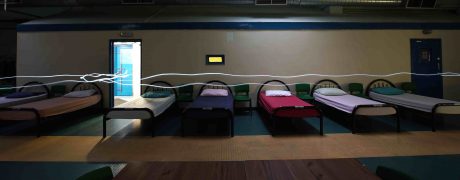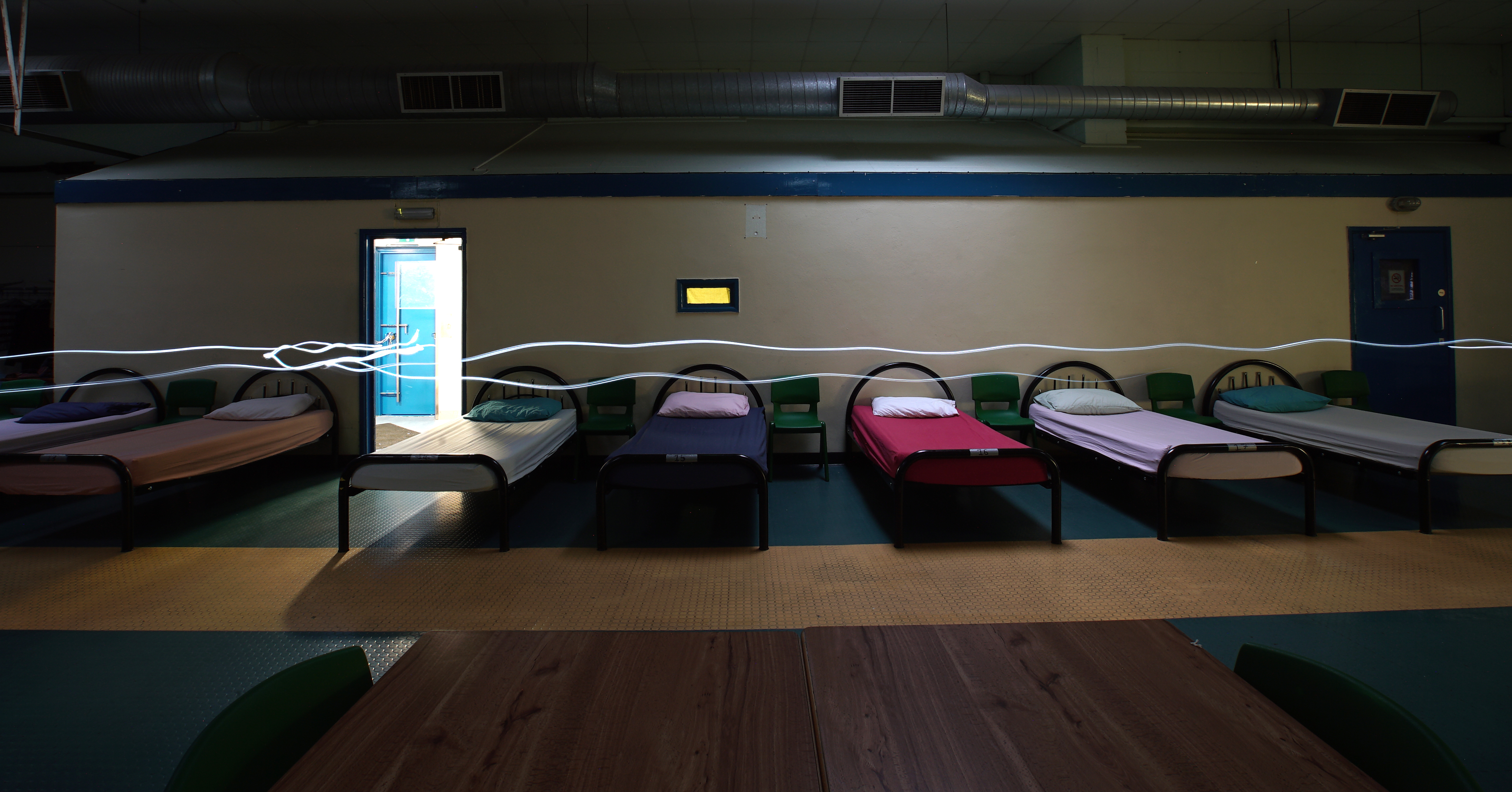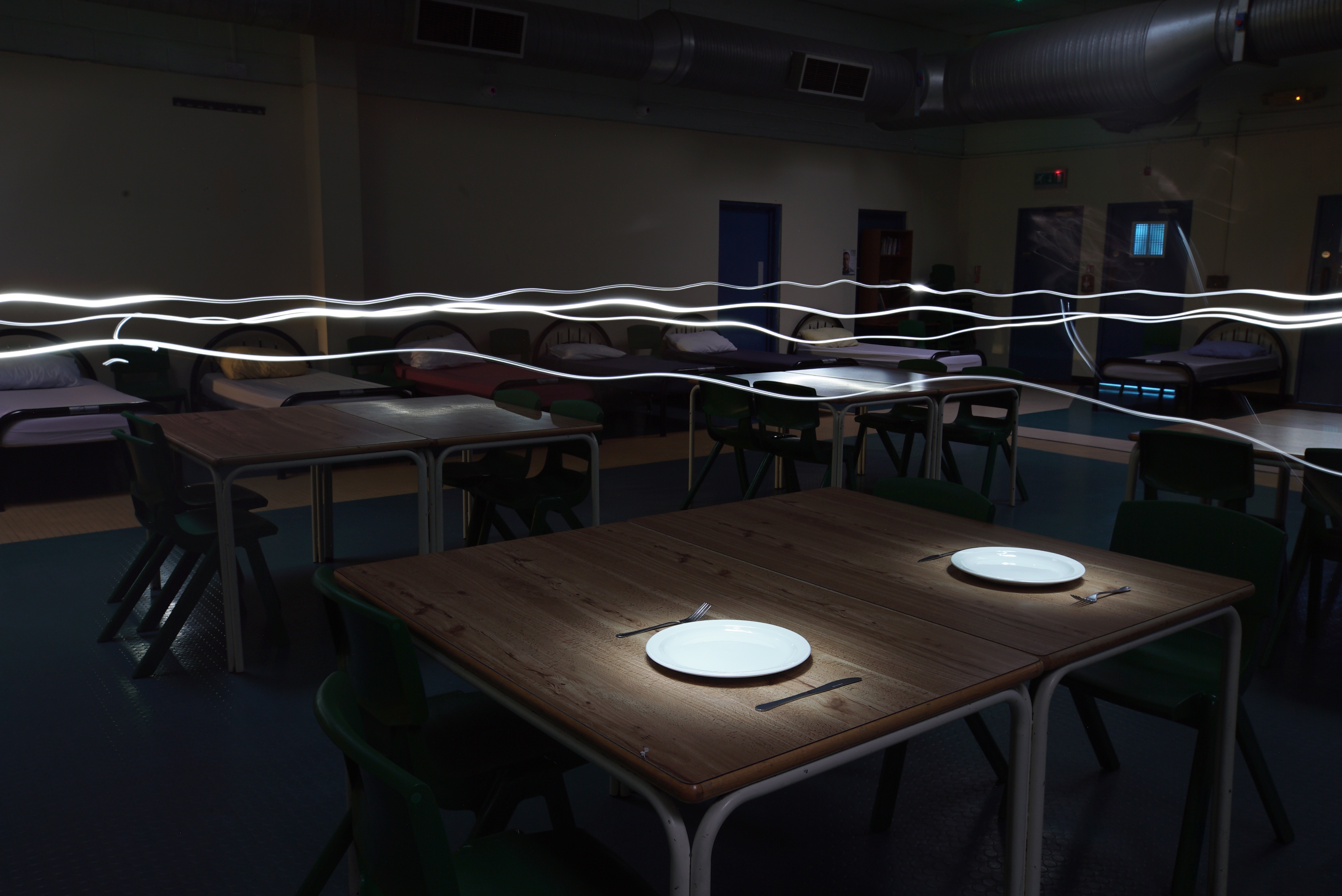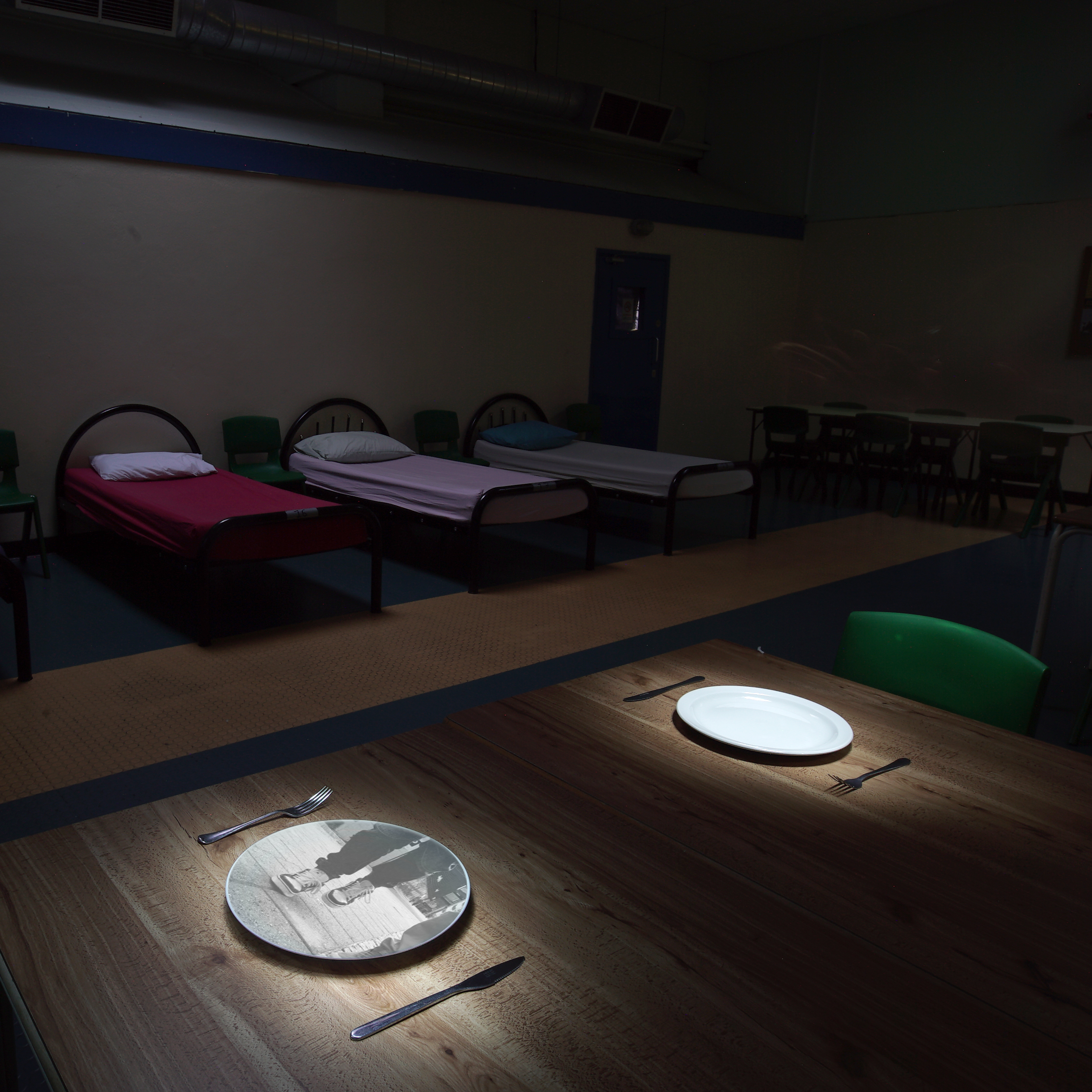Julian Trust Night Shelter Project – A Report.
From March to July 2017, funded by the Quartet fund and an additional kind donation from the Atticus fund, PECo theatre worked with Julian Trust Night Shelter guests and volunteer staff in their 30th year of working in the city of Bristol.
The aim of the project was to work with those disadvantaged by homelessness as well as those who work to support them, through documenting personal histories, stories and memories and engaging creatively with guests and volunteers around ideas for a theatre piece that might give voice to the life of the night shelter and those who go there.
We also aimed to gain the necessary training, skills and knowledge to enable us to respond appropriately and sensitively to individuals and situations when working in this setting.
The project sought to break down traditional boundaries between ‘us and them’ through focusing on shared experiences of the Night Shelter, by giving voice to the hopes, dreams and lives of the marginalised and destitute in our city as well as bringing much deserved positive focus to the work of the shelter itself.
We set up the initial engagement period in direct response to understanding that the issues in engaging the shelter’s guests – who are among the most disengaged even within the homelessness sector – would throw up challenges difficult to foresee and that would require us to be responsive and flexible.
It was also to allow us the time to develop our own understanding of working with people with complex needs and to explore what new creative approaches we should devise and implement that would be practical, possible and effective within the context of the shelter’s work.
We also needed to get to understand the sector better as whole, as the longer term work we expect to make – that this project is the first step towards – needs to be situated within an understanding of the context of current needs and developments both locally in Bristol but also UK wide.
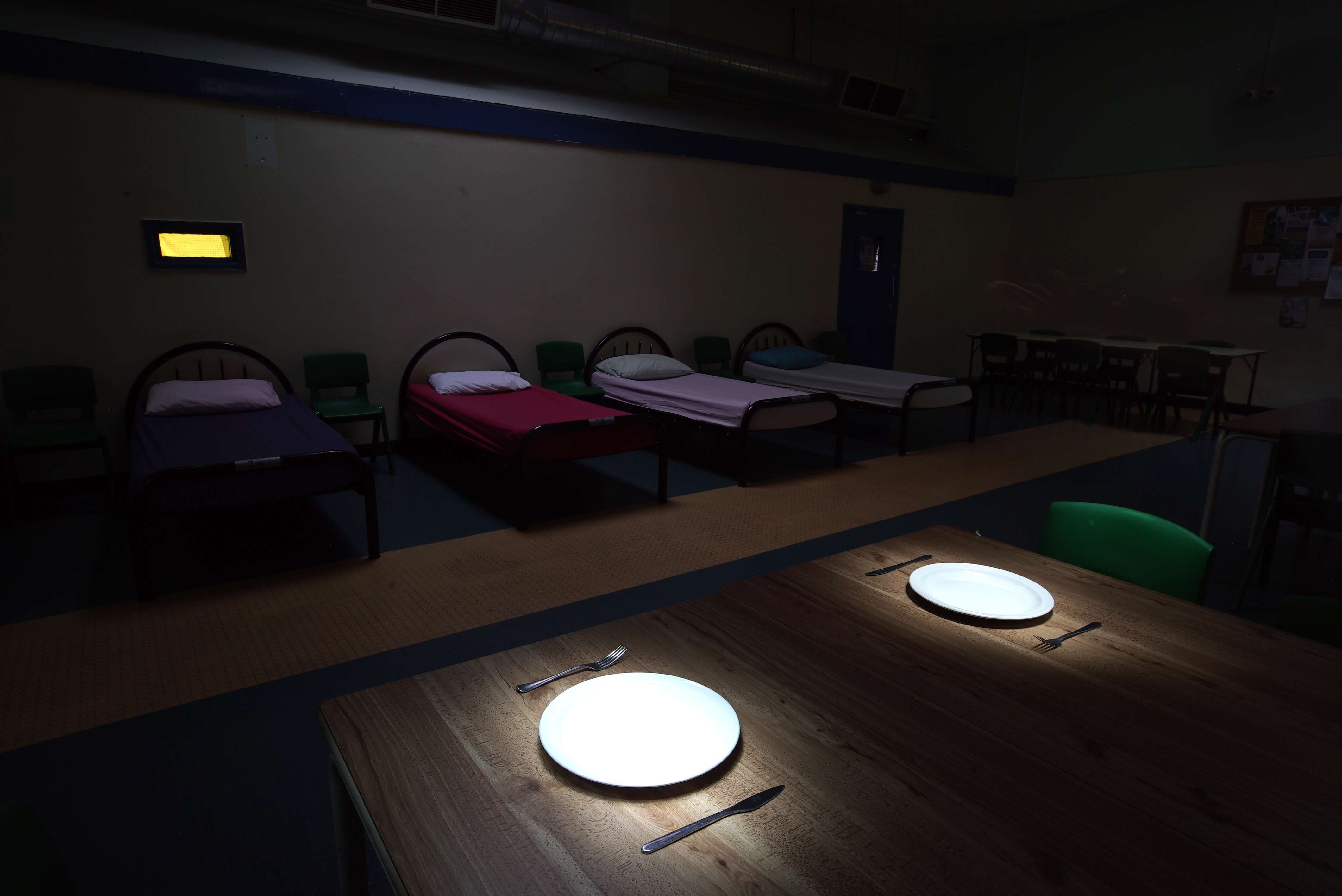
Engagement period
During the initial engagement period PECo’s creative team attended or undertook over 30 meetings, events or training sessions.
We held meetings with trustees and volunteers at the Shelter to set up an approach to working there, each gained training in volunteering at the Shelter and a rostra of regular volunteering nights for the artists was set up. We held regular team meetings sharing research findings, defining the parameters of the project and exploring ‘ways in’ to engagement and also attended events, seminars and training days on different aspects and areas of working within the homelessness sector. These included:
Homelessness Awareness Week Exhibition, the Island – This was an art exhibition curated by Art4change. PECo artists spoke with the curators and organisers of the exhibition who advised the two most important skills for working in this area are self-awareness and resilience. They advised contacting St. Mungo’s and DHI who might be able to give more mentoring and training around working in this area.
Women’s Homelessness Pathway Group Event, Triodos – PECo team spoke with a number of organisations who were able to advise and signpost us to further opportunities including:
The Golden Key project – a city-wide initiative that works with people with complex needs – many of whom have been homeless or close to – over a long period of time, to address those needs and share the learning with other agencies to improve services and understanding.
Missing Link – Bristol based cutting edge mental health service for women.
Places for People – social housing project supporting people off the streets and into supported living schemes.
Julian Trust Night Shelter volunteer training – each of the PECo team had an induction at the Shelter. This was a comprehensive run through of all the rules and regulations that keep the shelter running and keep everyone safe. They include issues around security and safekeeping. Each night at the shelter is made up of different volunteers with a different supervisor – most commonly one of the trustees – so each night has its own unique identity. Like a little family that come together once a week to do this job. PECo are now in quite a unique position in that we have visited each of these nights and perhaps are some of the few people who know what the whole looks like as a result.
Meet with Golden Key workers – met with 3 Golden Key team members. They use a model where they work with peer mentors, developing their skills at working in different scenarios as well as consulting them on everything to ensure that co-creation is at the heart of their project and its programming moving forwards. Of particular interest to us was their work with story telling, narrative therapy and Forum Theatre as powerful tools for engagement and personal development. They spoke of the frameworks and thresholds in storytelling. We were keen to explore connections between their work in this and our creative engagement with the guests at the shelter. How we can develop the ideas and content for a piece of performance that allows a similar kind of co-creation to that utilised by Golden Key feels really relevant and important.
Golden Key Story Telling Training day – we were given a training in the Golden Key peer mentoring story telling process alongside the peer mentors themselves. This was a compelling session about the power of storytelling and in how to engage by keeping things simple, accessible and powerful. Training peer mentors in story telling, the shapes of stories and how your story can be told using these structures, provides a helpful distance and allows us to see how we can be the author of our own story. We were shown how being able to tell your story is an important tool in taking control of your own identity and furthering your recovery, how empathy can be ignited with face-to-face, real life storytelling and that the act of sharing your story, of it being heard and the hearing of it, creates a surge of empathy and connection that is, in itself, transformative, for both teller and listener.
Golden Key Reflective Theatre Forum Training day – an extremely useful reflection tool, developed from Augusto Boal’s theatre of the oppressed technique, where spectators and actors become ‘spectactors’. His theatre sought to redress the power imbalance in society and between people through enacting scenarios where there was an imbalance and to replay the scenario with input from the audience as to how to make it better. The ‘audience’ can even get up onstage and act out the part they want, to ‘show’ what they mean rather than just telling an actor what they should do differently. So everyone becomes part of trying to redress the scenario so that it works better. In doing so people develop their capacity to imagine and enact change in their own lives. This technique is being used incredibly effectively by Golden Key facilitators in supporting mentors to reflect on situations that are arising for them in their work as mentors and in harnessing the group’s collective knowledge and ideas for how to work with and improve on any given situation.
Golden Key Peer Mentor Awareness Raising day – this was an opportunity to experience the Golden Key Human Library project first hand. Mentioned in their first meeting with us, we were keen to experience the impact of this human story telling project. Previously set up in libraries across Bristol where people could ‘check out’ a human being instead of a book, these are peer mentors who have volunteered to share their story widely. They have all undergone the story telling training and are a certain ways down their own road to full recovery. A very humanising and humbling experience to sit and listen to another human being telling you a story that is so full of pain and suffering and an emotional rollercoaster too as ultimately these stories turn into stories of survival, hope and recovery. What you experience is extraordinary, ordinary people transformed by the power they have found to turn their lives around – and each and every one of them did so with the help of at least one hand offered at just the right time, the power of connection with another human and a non-judgmental ear to listen.
This session also gave us the chance to speak with people from Re-Connect and Independent Futures. People who had lived experience of being on the streets themselves and are now actively involved in projects that support the homeless. They had very different responses to those we had had previously; that guests at the Shelter wouldn’t be able to engage with us in any deep way due to the chaos of their lives. They felt that if we found a way to work with the patterns of the guests lives rather than seeking to fit them into our prescribed idea of a structured format for engagement, we might be surprised by the results.
Mental Health Awareness Training at St Mungo’s, New Street – run by Laurie Grandi, training coordinator and Chris Thomas, homelessness outreach worker. A comprehensive session on mental health awareness with an additional focus on the issues that homelessness and complex needs could bring up in relation to the kinds of activities and asks that our project might require.
We were taken through a series of exercises and questions that helped us explore mental health barriers to engagement and communication as well as provocations that caused us all to question our assumptions about what mental health meant. We were taken through safeguarding and approaches for managing difficult situations and spent some time discussing our project with Chris Thomas whose role has been to engage with rough sleepers for the past year and who had very useful advice to give us. At the end of the session we were shown a graphic of Maslov’s hierarchy of needs. This represents the human needs that have to be met before a person is capable of engaging in particular ways. Creativity was shown right at the top, seen as something that can only be experienced once every other need has been met.
This is in sharp contrast to what we as artists have experienced, both in our own lives and in some of those we have been meeting through this project. There are times when creativity offers a crucial safety valve through which to express some of the most difficult and powerfully felt emotions and needs. For some it is a life raft not a luxury.
Creative time at the shelter
PECo team spent over 80 hours in a total of 30 different sessions at Julian Trust Night Shelter over the four months.
Our time there involved volunteering, working creatively, documenting stories and exploring creative ideas with guests and volunteers.
On first impressions the Shelter appeared clinical, like a field hospital perhaps, set up in the wake of a humanitarian disaster, clean, ordered, sterile. No encouragement to use the word home here, bright lights, straight lines, wipeable surfaces. No incentive to linger beyond the boundaries set up by food, shower, bed, sleep and leave – early, before the surrounding neighbourhood emerges blinking into the day.
This initial impression however belies the reality of an organisation that literally runs on kindness, generosity and compassion. Everyone here volunteers their time freely because they see there is need and that they can offer some assistance. Each night’s family of volunteers forms a close bond of friendship and camaraderie, each with their own preferred roles and functions that they cheerfully get on with on arriving, and most have at least one or two of the guests with whom they have formed some kind of connection despite the rules and regulations that govern the interactions here.
It is a place that teems with the best of what it means to be human despite – or perhaps because of – the harsh realities of the reasons for its existence.
In a relatively short period of time, due to the welcome and acceptance we gained at the Shelter, we learnt a huge amount about how it operates, its history, its challenges. About the amazing Meg Grimes who set it all up, about the trustees, many of whom were among those who set it up with her and who are still there today, about the committed community of current volunteers and of course about the guests themselves who use the services.
We also learnt a huge amount about the nature of Homelessness – that it rarely comes alone – and that using this one term ‘homelessness’ to describe the complexities of issues and needs that have resulted in someone sleeping on the streets, is to massively under represent the complex problems and challenges that are facing people who have found themselves in this situation.
Getting a roof over your head is just the start….
One of the most common observations made by long-term volunteers at the Shelter was how different the homeless population is now compared to even 10 years ago. That the amount of young people rough sleeping, as well as people from overseas, has increased massively and now entirely outnumbers the ‘old gentlemen of the road’ – as one long term volunteer would call her night shelter guests – that used to mainly comprise its population.
For us the biggest surprise has been seeing how broad the reasons for homelessness are, what this tells us about our communities, our society and our world, and how little these individuals and their stories fit into the lazy stereotyping of ‘the homeless’ that is still prevalent and that many us carry some shade of within us, often without even realising it.
We have came across so many reasons for the spiral into homelessness including family and relationship breakdown, sudden shocking trauma, illness and accident, redundancy, war – asylum seekers, ex soldiers – with PTSD and amputations, emotional and physical abuse, addiction, mental illness, austerity measures, cuts to social services impacting hostels and care programmes, lack of affordable housing, tenants rights taken away, benefit cuts, it goes on….
And of course rarely does one problem come alone or remain alone, each causes a knock on effect, like one rock falling can cause a landslide.
The Shelter is an emergency service. It has a ‘turn up on the night, no questions asked, first come, first served’ policy, so that the people that come through its doors each night – those lucky enough to get one of its 18 beds or who come to eat the free dinner provided, take a shower and get a new set of clean clothes – represent a kind of litmus test of societies current ills and injustices, their stories are representative of wider cultural issues and changes.
From students and working people who have lost the deposits on their flat and can’t afford another but don’t plan on being in this situation long, to traumatised asylum seekers under the official radar or who the council has been unable to house, to people suffering debilitating mental health issues or battling all consuming addiction, to young men living in tents in the parks or green fringes of Bristol, to those who have spent the majority of their lives on the streets and who can’t see any other way to live now, each of these situations is a failing of our society and community to catch the most vulnerable before they fall, and let’s not forget this could be any one of us at any time.
This isn’t the story of ‘them’ this could just as easily be the story of you and me, of any of us, of all of us. The fall of the dice, one percent more pressure here, a support system withdrawn there, it’s a paper-thin line and once crossed can become a deep gulf across which it is hard to come back.
Having experienced how transformative and empowering telling your story can be, we decided to reach out across that gulf by making this act of telling, witnessing and documenting, central to our engagement with guests.
We also decided the best approach to moving this into working creatively would be in one to one or small associated group settings, inside the night shelter and within the window of flexible time that the guests have from entry at 9pm to lights out at 11pm.
This gave us a clear timeframe and context in which to start to work and explore what approaches and creative tools might be appropriate and welcomed.
Working within the structures that the guests are inhabiting rather than imposing our own, has been one of the biggest shifts in approach and learning that this project has brought about.
This has meant that interactions differ from person to person, as everyone has their own interests and enthusiasms. For some it is an easy leap to make, to think about a creative activity like writing a poem or imagine how the shelter’s collected stories might be represented in a theatrical or visual way, and some lovely ideas for work have already come out of this. For others it is more alien or their interest is purely in the sharing of their story with us and their desire that it be shared in some way with a wider audience too.
Either way, this approach significantly impacted on the individuals we worked with, as well as on the Shelter community as a whole, as people are excited and intrigued by the idea of a piece of work being made inspired by them or the place they work.
We had set ourselves a goal at this stage, of documenting a minimum of 18 stories – to mirror the 18 beds available each night – from across the spectrum of the night shelter community; guests, trustees, volunteers and support workers such as St John’s Ambulance and so on. We have in fact documented over 30 stories, some of which are now in two acts as people’s situations changed and they wanted to come back and let us know the positive steps they had taken since the first documenting took place.
Sammy Weaver, the writer on this project gives some examples;
‘I recorded Peter’s story at the start of May and then again two months later. A volunteer introduced us and Peter was keen to talk and learn about the project. He talked readily and was happy to be recorded. He kept saying “it is important people know what goes on here”. Transcript from his first story:
“Diagnosis of cancer…the reason why all these stuff going the wrong way. I sleep opposite Tesco bin…many different places…small steps you know. My heart is homeless…I see my son maybe two years ago. I know one day my son forgive me about what I am…I need to apologise to my son about all this stuff…I can’t change the past. Like my mumma…like bigger heart” (about Meg Grimes)”
Two months later I see him again at the Shelter and he tells me he has just moved into his own rented flat. He is ecstatic and again really wants to get his story recorded. I can see that the act of telling his story and this recent positive change and the act of recording it mean a lot to him. In this second recording he talks about the specifics of his own personal journey and reflects upon the bigger themes that lead to homelessness:
“I am so so happy you know. I feel like I’m on a different planet. I feel brilliant because after all this experience I now cook for my friends, not rich people like before…I was so pleased I start to cry because it changed my life. Next step is to do something for this house.. which is doing something for me, which will give me power you know. I been no complain immigration guys like me because you come and you change some things for your life, you don’t have much power to change because of this barrier, language you know, it’s a different life you know. I feel so sad when I see English kids, they don’t have a language barrier, they don’t have respect for their lives you know”
Another guest Sean had a similar eagerness to tell his story and after a life on the streets was at a similar cusp of big, positive change. During his recording he gets close to tears as he reflects on where he has come from and where he is going. The timings of where they both are on their journeys and the offer of being heard through this project was very powerful. Both Peter and Sean state that they wouldn’t be able to be doing positive things now without their background in homelessness; it has prepared them for their futures.
Another guest Jose got involved in a very positive way through the creative writing activities. He talked about how he would like more creative engagement like those they have at Caring for Christmas. He also came up with some inspired thoughts for the project that we are keen to incorporate in any final piece.’
We currently have over 50 guests, volunteers and other associated individuals who have engaged with us either through having had their stories heard and documented, creatively engaged through artistic activities and discussions or whose work, interests and enthusiasm mean they are keen to continue to be involved in some way.
All of those we spoke to actively wanted us to document their stories and wanted their stories to be heard more widely. For them it was a question of needing people to understand, to see beyond the stereotype, to see who they are as human beings, to understand the conditions that have led to their situations. On the streets, you can quickly feel invisible as people pass you by, refuse to look, avert their gaze. Having a way for your voice to be heard can be a lifeline.
Next Steps
We set out on this project with an aim to bring benefit to the community at the Julian Trust Night Shelter, we hadn’t anticipated how deeply changed we also would be by our own experiences along the way.
Through connecting with people who are surviving some of the worst that life can throw their way and with those who are seeking to support them in whatever way they can, we uncovered the precious bond of our shared humanity. It has been a tenderising experience. A gift beyond measure in the most unexpected of places.
It is this feeling, this connection to our common human condition, plus the power of the individual stories in themselves, that we are most keen to find a way to communicate in the creative work that emerges. We feel if we can do this, and ensure as many people as possible get to experience it, we can be a part of helping make a difference.
We also know that we can only go on to make work inspired by all this, if people for whom homelessness has been a reality are at the heart of it. Our job is going to be to structure a process moving forwards that facilitates that, so all those working with us are able to engage at their own pace, feel safe, empowered and experience the benefits of being part of a shared creative endeavour, with all the accompanying sense of self fulfilment and achievement that that can bring.
For this to happen we need to create an on-going, longer term engagement that offers a pipeline through which people can grow and progress on their own terms, and through which we can take forward the idea of working with them in the co-devising of this piece.
In line with this and in the light of all our discoveries, we are in the process of firming up a detailed proposal for a set of steps for the second stage of this project.
Last word
We still have much to develop and discover but we do know some things for sure. We know that will be aiming to create a piece of theatre that is immersive and powerful, that is site-specific to and inspired by the Shelter but is also able to leave the site and tour the UK widely. We know that poetic text will frame and drive the piece, that audio visuals and projection mapping will be intrinsically integrated and that the 18 beds the shelter has to offer each night will play a role too. We know we’d like to co-develop the piece with people who have lived experience of homelessness and offer opportunities to incorporate the homelessness theatre group into the performance itself, and we know we want people to emerge from the experience, blinking into the day, with an awakening understanding and empathy, some ideas on how they can help, and a newly tenderised heart .……..
